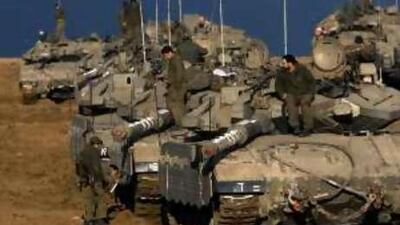TEL AVIV // Israel's air force and navy said they pounded the Hamas-run interior ministry, the Islamic University and the seaport in the Gaza Strip yesterday, attacking the territory for a third consecutive day in a violent assault that has already claimed the lives of at least 325 Palestinians and wounded more than 1,550 others. The Jewish state is also preparing to launch a ground invasion, with Israeli tanks, cannons and infantry units deployed on the border of the tiny coastal enclave of 1.5 million Palestinians that is ruled by Hamas. Israel declared areas around Gaza a closed military zone, a move analysts said may mean a ground operation in the impoverished territory. Ehud Barak, Israel's defence minister, told parliament yesterday that "we have an all-out war against Hamas and its proxies" and added that "the blow will cause the terrorist group Hamas to stop its activities". A senior Israeli military official said yesterday that the operation was just beginning. Dan Harel, the deputy army chief of staff, was quoted by a popular Israeli news website as saying that Israel "is hitting not just terrorists and rocket-launchers, but the whole government of Hamas and all its arms". He added that "not one building belonging to Hamas will stand after this operation - we are looking to change the rules of the game." While Arabs across the Middle East and those living in Israel were enraged by Israel's assault, Jewish Israelis remained overwhelmingly supportive of their government's actions. A poll taken by Israel's Channel 10 TV on Sunday showed that 81 per cent of Israelis support the Gaza onslaught. In interviews, some Israelis said they backed their army's actions because it was time for Israel to retaliate for the rocket fire. Yuval Moskovich, a 32-year-old who lives in the central Israeli city of Kfar Saba, said: "There is a limit to our restraint. The army held back for a long time - but it's not possible that the residents of southern Israel will suffer for so long." Eran Silberbush, an engineer from Tel Aviv, said: "Violence can't be one-sided towards Israel. Hamas will be more afraid of us now." Israel began launching its strikes last Saturday, eight days after a troubled, six-month truce with Hamas expired, saying it wanted to halt the rocket fire at its southern communities from Gaza. The cabinet of Ehud Olmert, the prime minister, on Sunday approved the call-up of 6,700 reservists to take part in the attacks. Israel has so far struck rocket-launching pads, weapon manufacturing and storage facilities, warehouses, a mosque it claimed was used for "terrorist activities," a main security and prison complex of Hamas in Gaza City, a fuel tanker, a Hamas television station and smuggling tunnels, the military said. Israel's strikes yesterday appeared to target several important Hamas symbols in Gaza. They included the interior ministry, which Palestinians say was the first government building hit in the offensive, and a laboratory building at the Islamic University, which serves as a Hamas cultural symbol. In reprisal, Hamas and other Palestinian factions in Gaza have fired more than 150 rockets and mortars at southern Israeli communities in the past three days. One missile that landed yesterday on a construction site in Ashqelon, a city of about 120,000 people that is 17 kilometres north of Gaza, killed a 27-year-old Israeli Arab worker, the second Israeli to die from a rocket since the operation began Saturday. Israel says Hamas is increasingly using more sophisticated, longer-range missiles to reach deeper into its territory. They have the capability of targeting population centres some 40km away from the Gaza border. Hamas officials have remained defiant despite the attacks, and have accused the international community of not doing enough to stop the killings. A Hamas spokesman, Fawzi Barhoum, told news agencies that Israel "is committing a holocaust as the whole world watches and isn't lifting a finger to stop it". Mr Barhoum added that Hamas may hit back with suicide attacks, which the group has not carried out in Israel since 2005. Of the Gazans who have died so far, at least 57 were civilians, a spokesman for the UN Palestinian refugee agency. Hamas has said that at least 180 of the dead were members of its security forces. Some prominent Israelis are warning that should Israel's operation be expanded, it may lose the public support it currently enjoys. Amos Oz, one of the best known Israeli novelists and a distinguished left-wing figure, said the "mass killing in Gaza" will not help Israel and may even benefit Hamas. "Israel, from its position of power now, should offer [Hamas] a truce with the mediation of the moderate Arab states and the Palestinian Authority," he told Israel Radio. vbekker@thenational.ae

Tanks mass on border as war looms
Israel's air force and navy said they pounded Hamas buildings and they are looking to change the rules of the game.
Most popular today
5
